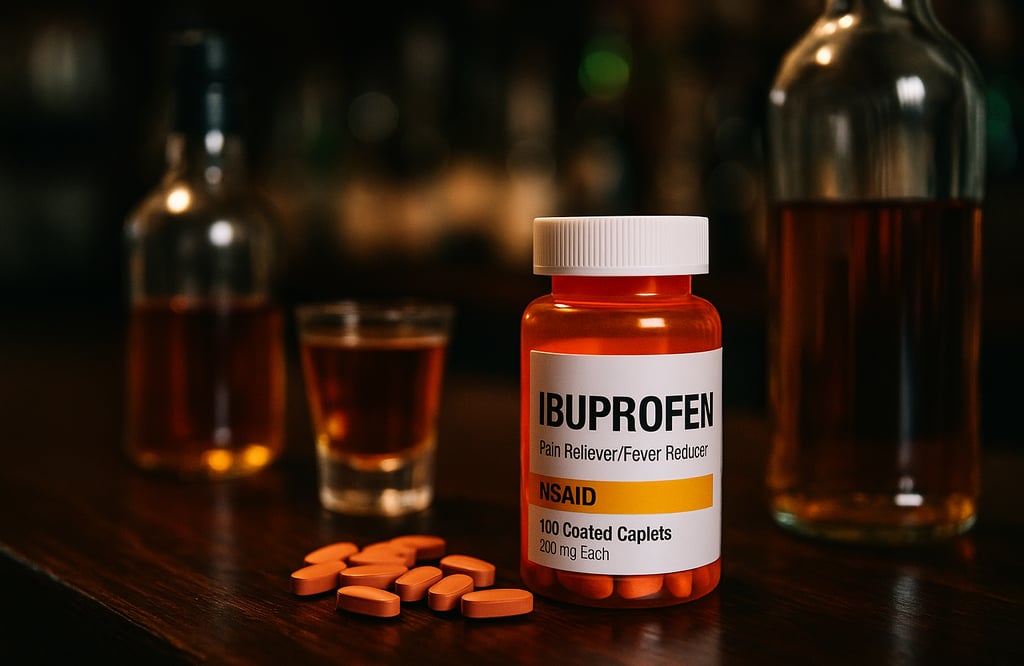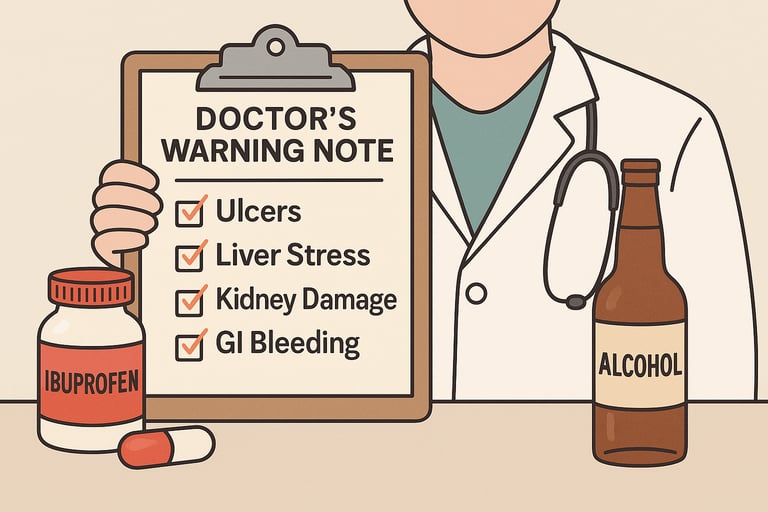Ibuprofen and Alcohol: Why Mixing Them Can Be Risky
Mixing ibuprofen and alcohol can be dangerous, increasing risks of ulcers, liver stress, kidney damage, and bleeding. Learn what happens when you combine them, how much is too much, and safer alternatives for pain relief and social situations.


Ibuprofen and Alcohol: Why Mixing Them Can Be Risky
Why People Combine Ibuprofen and Alcohol
Ibuprofen is one of the most commonly used over-the-counter pain relievers, while alcohol is a regular part of many people’s social routines. It’s easy to see how the two often get mixed together without much thought.
For example, you might reach for ibuprofen the morning after drinking to ease a headache, without second thought. Or, you might take ibuprofen for sore muscles before heading out to an event where alcohol will be served.
On the surface, this may not seem like a big deal. But both alcohol and ibuprofen put stress on the stomach, liver, and kidneys. When used together, those effects can overlap and amplify, raising the risk of harmful side effects. Knowing how they interact is the key to avoiding problems.
The Dangers of Mixing Ibuprofen and Alcohol
When ibuprofen and alcohol are in your system at the same time, they can interact in several harmful ways:
Increased Risk of Stomach Damage
Both ibuprofen and alcohol irritate the stomach lining. Taken together, they can dramatically increase the risk of:
Gastritis (stomach inflammation)
Stomach ulcers
Gastrointestinal bleeding
Warning signs include stomach pain, nausea, vomiting blood, or black tarry stools. These symptoms require immediate medical attention.
Strain on the Liver
While ibuprofen is primarily processed by the kidneys, it still passes through the liver. Alcohol is metabolized in the liver as well. Combining the two increases the liver workload and can increase the risk of liver inflammation or damage — especially with heavy drinking or long-term ibuprofen use.
Impact on the Kidneys
Ibuprofen reduces blood flow to the kidneys, and alcohol can contribute to dehydration. Together, they increase the risk of acute kidney injury. This risk is higher if you are older, have kidney disease, or take other medications that stress the kidneys.
Higher Risk of Heart and Blood Pressure Problems
Alcohol can raise blood pressure and heart rate. Ibuprofen, like other NSAIDs, can also raise blood pressure and increase cardiovascular risks with regular use. Combining them brings the potential to further strain the heart and blood vessels, especially in people with hypertension or heart disease.
How Much Is Too Much?
A single drink combined with a standard dose of ibuprofen is unlikely to cause major harm in most healthy adults.
However, the risks increase with:
Higher alcohol intake (more than 1–2 drinks)
Repeated use of ibuprofen
Long-term daily use of either substance
Existing medical conditions (ulcers, liver disease, kidney disease, heart disease)
If you drink heavily or often, even occasional ibuprofen use can pose significant risks.
Safer Practices if You Have No Choice But to Combine the Two
The safest option is to avoid mixing ibuprofen and alcohol altogether. But if you do find yourself in a situation where both are necessary:
Wait at least 6–8 hours after drinking before taking ibuprofen.
Stick to the lowest effective dose of ibuprofen.
Always take ibuprofen with food to help protect your stomach lining.
Try to avoid alcohol completely if you are taking ibuprofen regularly, or at higher prescription-level doses.
Stay hydrated and watch closely for any signs of stomach pain, unusual fatigue, dark urine, or swelling.
When to Seek Medical Help
Get medical attention immediately if you are or notice:
Vomiting blood
Black or tarry stools
Severe stomach or chest pain
Unusual swelling or changes in urination
Yellowing of the skin or eyes (possible liver stress)
These can be signs of serious complications and should never be ignored.
Key Takeaway
Combining ibuprofen and alcohol may not always cause an immediate problem, but the risks increase sharply with higher doses, frequent use, or underlying health conditions. The best practice is to avoid mixing them whenever possible. But if pain relief is needed while drinking, talk with a healthcare professional about safer alternatives.




